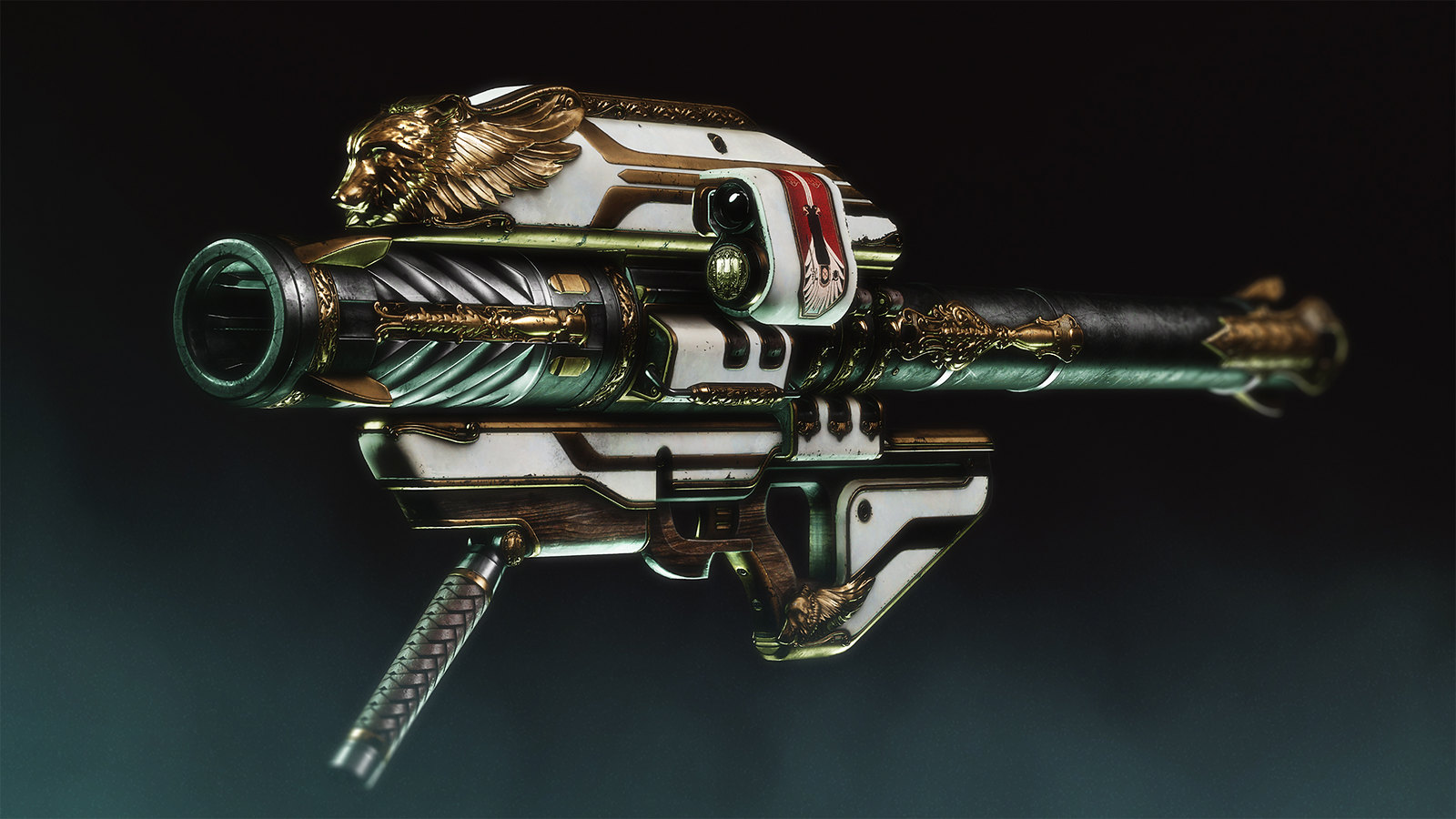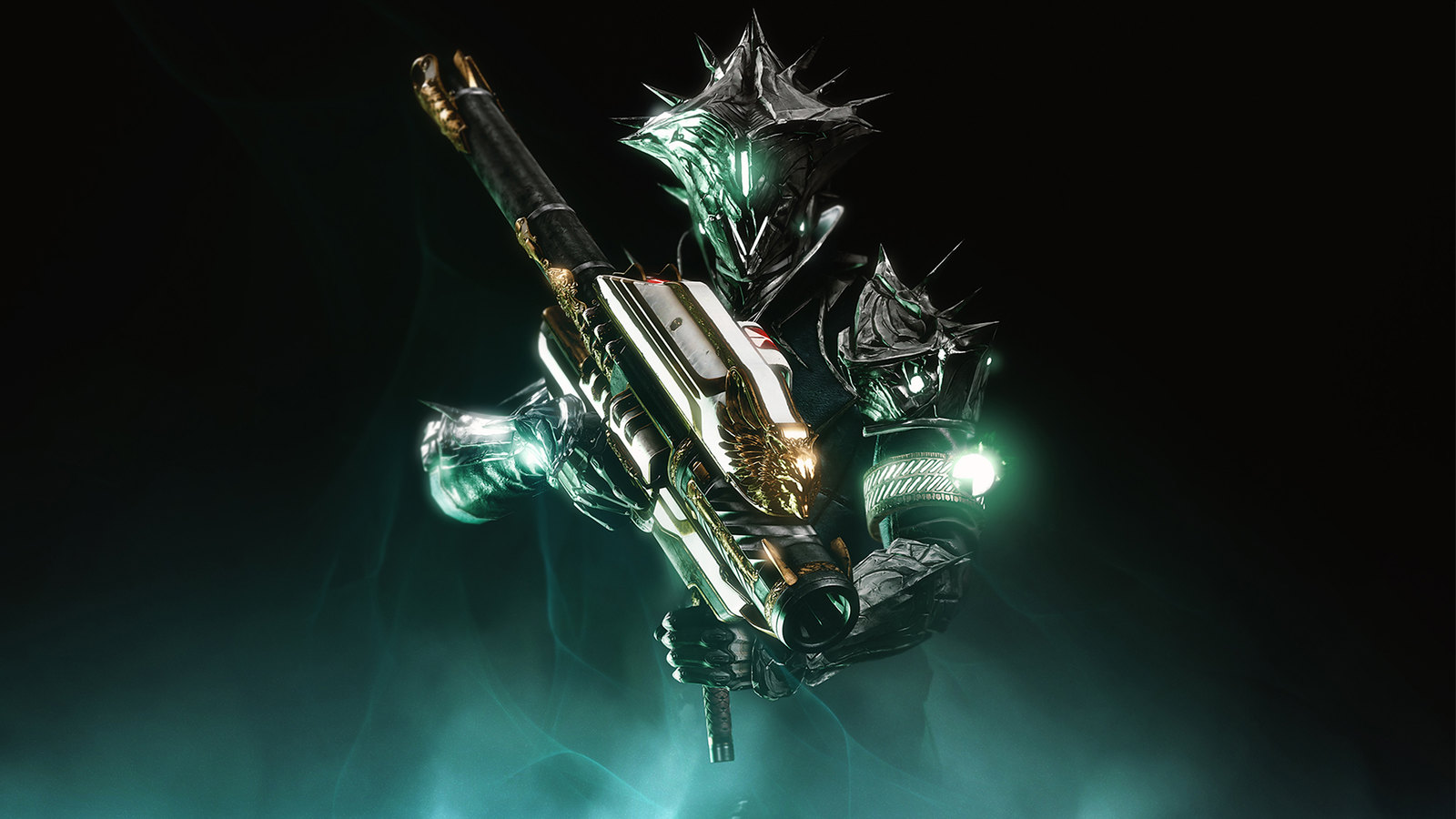There have been many amazing weapons throughout Destiny’s history. Some have achieved notoriety for their effectiveness in combat or their startling beauty. A handful have earned legendary reputations for their unique traits or memorable backstory. Then there’s Gjallarhorn. The Exotic Rocket Launcher, introduced in the original Destiny, has become a hallmark for players since its debut in 2014.
As Bungie celebrates its 30th anniversary in 2021, we’re celebrating in the only way we know how: By continuing the party in Destiny 2 with our amazing community. As part of that celebration, we’re bringing back Gjallarhorn with a new Exotic quest that will grant players the opportunity to add the powerful Rocket Launcher to their arsenal.
While the Gjallarhorn of Destiny 2 will feel familiar to long-time fans, the team behind its return have included some fun twists that prove that even old… ahem, wolves can be taught new tricks. Recently we caught up with the Destiny development team to learn more about what went into the return of Gjallarhorn.

Legacy of Boom
“Gjallarhorn was one of the first Exotics that really made you feel overpowered, especially against bosses,” said Bungie designer Brandon, who led the gameplay design on the weapon’s return to Destiny 2. When asked about the legacy of the weapon he added, “It was also incredibly elusive for players that didn’t buy it from Xûr in the early weeks of Destiny.” [Editor’s note: “Why would I waste my heavy slot on an exotic rocket launcher?”]
Those who managed to snag Gjallarhorn from the vendor were lucky indeed; most players found it as a rare drop at the end of raids such as Crota’s End or Vault of Glass, among other sources. But even then, it remained elusive and (as such things are wont to be) highly sought after. As Brandon puts it, “Who didn’t scream out loud when they finally got the weapon to drop after months of grinding?”
Bungie’s Mark Flieg, a senior artist who worked on the visual effects (VFX) on Gjallarhorn in Destiny 2 as well as on the original weapon in 2014, thinks there are several reasons for its hallowed reputation. “It was one of the first Exotic weapons in the game, meaning there were far fewer other ‘hero assets’ to choose from (since you can only equip one Exotic at a time). It’s a beautiful weapon with a unique and regal look that set it apart from the others; and the ability to clear the playing field with a few shots made it a fun tool in your arsenal.”
That ability to clear a room is thanks in no small part to its intrinsic Wolfpack Rounds, where rounds fired splinter into multiple clusters of explosives tracking down their targets. As a result, a fireteam full of Gjally-equipped Guardians in the original Destiny would cause even the staunchest foes to cower in fear.
For the weapon’s return in Destiny 2, the team gave the Rocket Launcher some timely updates that make it just as effective. Lead designer Brandon said the goals were to maintain that feeling of being overpowered that the original Gjallarhorn offered, while also giving it a touch up to compete with the Exotic Rocket Launchers found in the modern sandbox.
“There was no question that the Wolfpack Rounds perk from the original was a crucial part of the weapon’s identity, so we kept it as the intrinsic perk in Destiny 2,” he said. “We also wanted to update the weapon by adding a new perk called Pack Hunter which would give it even more power when using it in a fireteam.”
That new Pack Hunter perk is one of the prime examples of how Bungie can update a weapon for the modern sandbox, while still maintaining a weapon’s original flair. With Pack Hunter, Gjallarhorn extends the Wolfpack Rounds to Guardians in range who are wielding a non-Exotic Rocket Launcher. In addition, the Destiny 2 Gjallarhorn catalyst enhances the perk to create more Wolfpack Rounds when the initial round gets a final blow, and also gives the weapon two rounds in the mag.
“The Pack Hunter perk came about when we were thinking about the player experience in the original Destiny,” Brandon said. “Often fireteam leaders would require that everyone in the group have Gjallarhorn equipped for harder content such as raids, much to the dismay of players that didn’t have the weapon yet. I thought it would be fun to turn that idea on its head by making the perk require only a single person to have the weapon equipped while still allowing everyone in the group to ‘have’ Gjallarhorn.”

Beneath the Ice
The work of bringing Gjallarhorn into the modern age was a careful balance of past and present. As Bungie staff artist Matt Lichy says, “I wanted to try and keep the overall look that was crafted back in Destiny 1 as much as possible but bring it up to the current quality standards that we use now.”
Lichy said he referred to the original textures of the weapon (built by former Bungie artist Mark Van Haitsma) and updated it for the modern game’s higher geometry budgets and new PBR (physically-based rendering) shader methods. Though the Destiny 2 Gjallarhorn does have some additional detail to the front of the weapon and its upper cowling, Lichy said the goal was to maintain the iconic look of the original.
“Weapon reprisals are what I’d consider ‘iceberg assets,’” said VFX artist Mark Flieg. “The final product that players see represents only a fraction of the work that goes into each one.” So what, then, was the “work hidden beneath the surface?”
“My primary focus [was] to drive the design and provide players feedback to their actions. If people are focusing on the VFX after the first few shots, however, I’ve missed my mark – my intention is to help you feel your shots, without taking away from the action.”
True to its namesake – the mythical Norse horn blown by Heimdall – Gjallarhorn is more than just its iconic look; it needed to sound great too. Bungie sound designer Noah Sitrin worked on making the wolf howl.
“We wanted to make the weapon feel as special and powerful as players remember when they first got ahold of it in D1,” Sitrin said. “We also wanted to distill the weapon’s audio theme and spread it across every sound it makes. This meant leaning heavily into the ornate, wolfish, and larger-than-life qualities of the Gjallarhorn.”
While much of Gjallarhorn’s fundamental sounds – such as firing and its associated explosions – are relatively unchanged from the original Destiny, some of the secondary sounds were significantly upgraded. “I started from scratch on secondary sounds, such as reloads, handling, and targeting and packed a lot of character in to make it feel like a finely crafted, but brutal weapon. We used plenty of heavy mechanical elements, and animal growls morphed with synthesized basses to give it that intense, animalistic quality.”
If you already think the Wolfpack Rounds perk is cool, just wait until you hear it. Sitrin explained, “A big part of the fun in this new Gjally is being able to share the Wolfpack Round perk with your teammates. Initially, the only way you could tell if the perk was active was the short growly sound that plays when teammates get in range. This indicator gets the job done, but we felt that there was an opportunity to go for some stronger theming here.
“We thought, ‘What better way to let you know wolfpack rounds are active than for everyone’s Rocket Launchers to howl as they fire?’ This change was really well received in playtests, and personally made me smile as soon as I got it working, so of course it had to stay.”
A labor of love – that’s what the return of Gjallarhorn has been for the entire team at Bungie. We look forward to seeing Guardians enjoy this reprised weapon and watching the videos of all those Wolfpack Rounds creating chaotic beauty across the solar system. Enemies of humanity, consider yourself warned!
Bungie’s 30th Anniversary Pack is available now.

Forging the Horn – Behind the scenes of Gjallarhorn’s return in Destiny 2
Source: Balita Araw

0 Comments